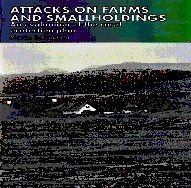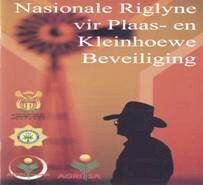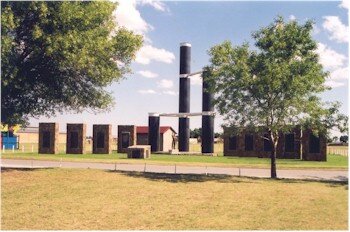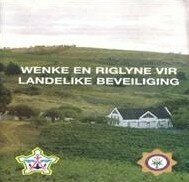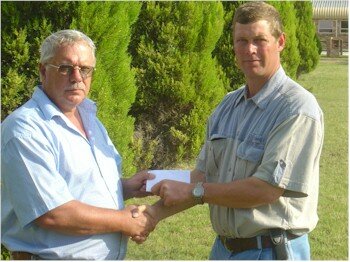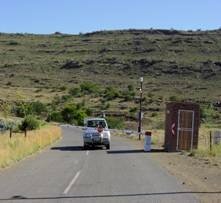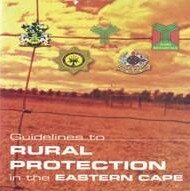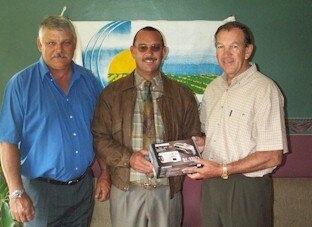
AGRI SECURITAS TRUST FUND
Search
HOME PAGE | AGRI SA | GENERAL AFFAIRS CHAMBER | COMMODITY CHAMBER | AGRICULTURAL BUSINESS CHAMBER | AGRI_SECURITAS | CORPORATE LIAISON | BUSINESS PARTNERS | OTHER LINKS | DOCUMENTS
|
The agricultural industry is a valuable sector in the South African economy and is indispensable in terms of its contribution to social welfare, peace and national stability. The consistently high incidence of crime in the rural areas, but particularly the ongoing spate of farm attacks and murders of farmers, farm workers and their families, seriously hampers the stabilising role that agriculture plays in rural areas. The safeguarding of the agricultural community is one of the highest priorities within Agri SA. The Trust Fund strives to make supplementary contributions to improve the agricultural communityís safety so that it can continue to produce food and fibre for the countryís population. With the inception of the Trust Fund, former President Nelson Mandela gave his support to the Fund, and the current President continues to support this effort. The Trust Fund is managed by a team of expert agricultural, business and public leaders who accepted the responsibility to manage the finances of the Trust and to identify the projects that are to be financed. Objectives of the Trust Fund The overall objective of the Trust Fund is to contribute to the protection of rural areas and to improve the alertness of the rural community by:
The importance of agriculture in SA and Africa South Africa comprises approximately 3.8% of the African continent, while only 14% of the total surface area of South Africa consists of arable farm land. South African farmers produce 25% of maize and 13% of wheat cultivated in Africa. In the South African Development Community (SADC) region, South Africa produces 58% of maize and 87% of wheat. South Africa's total grain production represents approximately 61% of production in Southern Africa, while total red and white meat production in South Africa constitutes about 66% of total production in Southern Africa. South Africa is also the largest producer of sugar, milk and fresh fruit in Southern Africa. In the total picture of agriculture production - in Africa and the world - South Africa is an exception par excellence. Notwithstanding the security threat that South African farmers face on a daily basis, the whole of Africa as well as the rest of the world is envious of the South African farmer's expertise in the agricultural field that continues to ensure that our country, as well as many neighbouring states, have sufficient food. Contact details: Kobus Visser
Trust Fund registration number: 6461/01 Partners of the Trust Fund The following companies are acknowledged for their monthly financial contributions towards the Trust Fund: click logos for more:
Activities
PROJECTS FINANCED BY THE TRUST FUNDNATIONAL PROJECTSEvaluation of the Rural Protection Plan
Profile study of convicted criminals Technikon RSA conducted an inquiry in order to compile a profile of a criminal - who had already been sentenced - involved in farm attacks. To this end, interviews were held with 48 convicted criminals in prison. They were asked why they had become involved in the attacks and why victims had been murdered with such violence after the criminal had already succeeded in his objective. The study was completed in 2001. Action Stop Farm Attacks A countrywide petition campaign was launched on 31 May 2000, calling on the government to take effective action to curb farm attacks. The ultimate objective of the campaign was the total eradication of farm attacks, with the emphasis on mobilising the public of South Africa and to generate maximum pressure locally and abroad so that the government would commit to a more effective effort and make the resources available to prevent farm attacks. A further important objective was to ensure that the rural community, and especially farm dwellers were more prepared for such attacks. Inquiry into the criminal justice system The Institute for Security Studies (ISS), at the request of Agri SA, conducted an investigation for the organisation's National Law and Order Committee to identify shortcomings in the criminal justice system and to ascertain why existing sentences do not serve as a deterrent for farm attackers. The purpose of this was also to analyse crime trends and demographic information so that future trouble spots could be identified and proactive steps taken. Part of the investigation also focused on the possibility of the death penalty for certain violent crimes. SAPS Security Brochure
Training in battle indications Lukas Swart was appointed by the South African National Defence Force (SANDF) to present training seminars countrywide aimed at equipping the farming community with relevant information to anticipate and deal with farm attacks. Battle indications are the guidelines that criminals follow in order to carry out their tasks. In all farm attacks these indications were visible beforehand. This means that, if one had had this information at that time, many farm attacks could have been prevented. The Trust Fund made a financial contribution towards the training seminars, which ensure that the information that becomes available can prevent many farm attacks. Obelisk to commemorate farmers who were murdered during farm attacks
Financing of organised agriculture's security committees The unacceptable high levels of farm attacks necessitates the input and participation of all representatives from the nine provinces to be able to offer effective protection countrywide. The co-operation of provincial representatives are also vital to implement and manage the Rural Protection Plan, of which Agri SA forms part. All role-players within the broader Agri SA family must plan together and co-ordinate in order to make a difference to the security situation on farms. To achieve this objective, the Trust Fund made a contribution to Agri SAís national as well as nine provincial security committees to enable them to effectively perform their functions and role within the Rural Protection Plan. Trauma Workshops Reformanda Counselling Service in Potchefstroom developed a special trauma assistance programme for victims of farm attacks. The service was specifically introduced to focus on traumatised victims of farm attacks and to assist them so that they could resume their place in society. In addition, the programme focuses on equipping people with the necessary skills - through relevant training courses - to assist fellow-community members with trauma-related counselling. These courses are also available to church leaders, social workers and members of the SAPS who are often the first to deal with traumatised victims after an incident. It is important to know who to deal with traumatised victims from the start. The Trust Fund has made a contribution to the counselling service in support of its continued counselling service at the University. PROVINCIAL PROJECTS KWAZULU-NATALKwanalu: Security Desk During May 1998, Kwanalu established a Security Desk to assist, inter alia, with the implementation and monitoring of the Rural Protection Plan in KwaZulu-Natal. The safety of the entire rural population remains one of Kwanaluís key priorities and the organisation caters for the needs of both members and non-members in the province. The Security Desk is responsible to the Kwanalu Board of Directors and functions under management of the organisationís Chief Executive Officer. Nottingham Road: Radio Network The service area of Loteni Ė Inzinga Farmersí Association near Nottingham Road has recently experienced various crimes such as murder, housebreaking, theft, stock theft and vehicle hijacking. The farmersí association established a police forum, which meets monthly and carries out patrols and road blocks in collaboration with the police. The greatest problem experienced by the association is poor communication. Cellphone reception is non-existent in the hilly area and telephones are regularly out of order. The Trust Fund made a contribution towards the installation of a radio network to improve the safety of the community in the area. WESTERN CAPEFinancial contribution towards radio communication The BreŽ River District Agricultural Union, Worcester Commando and the respective farm watches in the area had approached the Trust Fund for a financial contribution towards the implementation of a radio system that would benefit all role-players. There is no communication between the farm watches and the commando during operations executed in terms of the Rural Protection Plan. The commandos operate on a high band frequency, which makes it impossible to communicate with them. The Trust Fund made a financial contribution towards the hardware, which facilitates a link between the high and medium band radios, which in turn will benefit the broader community and improve communication relating to security matters. Swellendam District Agricultural Association: Farm watch signboards Swellendam District Agricultural Union has installed ten farm watch signboards in its district to promote rural safety. The purpose of these signs is to provide the area with a number system whereby response times can be shortened. A financial contribution was made towards the purchase of the boards. Riversdal Rural Protection: Radios Riversdal Rural Protection has approximately 500 members and serves an area of 3 600 square km, where the farm watch plays an active role by patrolling the area. There is also regular communication with the SAPS and commandos. The Trust Fund has donated a number of radios to Riversdal Rural Protection which the farm watch will use in the course of their duties. These radios should considerably improve the communication capacity of the farm watch and will contribute towards effective combating of crime in the area. Malmesbury: Radio communication improved The Swartland Commando in the Malmesbury district had no capacity to communicate with local farmers or the commandos and the SAPS during patrols and follow-up actions. The Trust Fund, in this case, made radios available to the farm watch to strengthen its command and control capacity, to improve communication and to facilitate effective co-ordination. Vredendal: Information brochure on farm security An information document was compiled by the commando and farm watch setting out the principles of rural protection within a single document. The information has already been tested and can be applied effectively at grassroots level. The following aspects, among others, are covered in the information document to which the Trust Fund made a contribution:
SAFETY BROCHURE
GPS System Agri Western Cape represents farmers within the province at provincial level and in Agri SA and, via its grassroots structures, is actively involved in the implementation of the Rural Protection Plan. It also serves at provincial level in the POCOC. Agri Western Cape applied to the Board of Trustees for funds to purchase a Global Positioning System (GPS) that would be made available to commandos in the Western Cape to determine the longitude and latitude of all homesteads on farms and to capture such information on computer via the GPS system. The advantage of a charted area is that response times are shortened in an emergency; the commando knows exactly where all occupied homes in its area are, and it facilitates control over contingencies such as the monitoring of alarms. The Board of Trustees approved this application. Swellendam: Farm Watch Radio The Swellendam District Agricultural Association applied for funds to purchase a radio system that they wanted to install in the vehicle of the farm watch. The co-ordinator did not have a tradio for his vehicle to perform the co-ordinating function for six farm watches in the Swellendam and Buffelsjag River area. The radio will remain the property of the Swellendam District Agricultural Association and, as soon as another co-ordinator is appointed, the radio will be relocated. FREE STATE Reitz: Riemland Control Centre Farm safety remains one of Riemland Controlís highest priorities and, with the technology already installed, the centre is well positioned to make a positive contribution towards activating various disciplines when an incident occurs. In order to accommodate the range of activities, the centre had to invest in computer and radio equipment. To facilitate and accelerate response to emergency calls, it is essential that all members are registered with Riemland Control so that the database can be updated on computer. The Riemland Control Centre is the CCC Centre for the entire eastern Free State, and co-ordinates actions taken by the Traffic Department, the SAPS, the Fire Brigade and the Emergency Services (EMS) for any eventuality where its services are needed. All parties whose help is needed at an accident scene or in impending disaster situations, including farm attacks, in the eastern Free State, are now deployed from and co-ordinated by Riemland Control in Reitz. With the expansion of the control room at Free State Co-op emergency services and assistance can be dispatched to a crime or accident scene within three minutes. The Trust Fund approved a contribution towards the financing of the required computer and radio equipment. Senekal and Zastron: Control Centres Both these districts have established control systems within security association context in each district. The control centres will be responsible for driving and monitoring the Rural Protection Plan within the particular district. In terms of the Plan all security-related aspects, such as personal alertness, homestead protection and physical safety are co-ordinated. The Protection Plan was developed for each district and was signed jointly by the SANDF, the SAPS and organised agriculture. Each farmer who joins the security association is visited on his farm where the content of a safety manual containing safety suggestions is explained to him in detail. An evaluation of the homestead is made to determine whether it meets the minimum security standards, and practical suggestions and recommendations are made to the farmer.. Regular follow-up visits are planned where each farmerís own improvements are evaluated by the SANDF. The funds approved by the Trust Fund will be used mainly for the following: installation of a repeater and booster; the installation of antennae; upgrading of the software and console radios. Bethlehem: Rural Control Centre The centre was launched on 23 March 1998 and is currently financed with membership fees. This centre works closely with the SAPS and local commandos for swift response in any emergency. The SAPS has even allocated members to the centre in the event of an emergency. The centre offers the following services to farmers and members:
The most effective way to overcome the communication problem in the area is to install a relay station that will offer the farmer the necessary connection at an affordable price. Farmers, farm workers as well as farm schools are visited regularly by members of the commando and the SAPS. The Trust Fund made a contribution towards the financing of a repeater to improve communication. Frankfort Agriculture: Emergency fund During a farm attack on 22 June 2001 in the Frankfort district, Mr Ben du Plessis was shot five times. After the attack Mr du Plessis was is a serious condition and was admitted to the intensive care unit of the Hoogland Clinic in Bethlehem where his condition stabilised over a period of two days. Because of financial problems he was unable to pay his premiums and his medical fund had lapsed. He therefore had no cover to pay the medical costs. This meant that he had to be removed from the intensive care unit and transferred to the Riemland Clinic in Frankfort. Mr du Plessis and his three sons are all memebers of organised agriculture. Frankfort Agriculture established an emergency fund to raise money to make provision for Mr du Plessisí medical expenses as his condition was by no means satisfactory at that stage. The farmersí association asked for contributions to cover Mr du Plessisí existing medical expenses. The request was supported by Frankfort Agriculture and Free State Agriculture, both of which have already made a contribution to the emergency fund. The Trust Fund made a financial contribution to this fund. Emergency reporting centre promotes awareness
The entire region has access to cellphone and telephone services, and by making use of the speed dial facility and a panic button on land lines, the client can, by pressing a single button, make contact with the centre. All personal details are captured on a computer and the client himself can identify all the role-players and interest groups that must assist him in the event of an emergency. The SAPS and SANDF form an integral part of the centre's activities. The funds allocated by the Trust Fund will be used to purchase equipment to improve the effectiveness of the centre.
EASTERN CAPE Post Retief Farmers's Association: Access control project The Post Retief conservation area comprises approximately 100 000 ha and is home to almost 4 000 people. The farmersí association exercises access control by means of booms in the area. Members in the area have already erected guardhouses. There is a need for financial assistance to install lighting, road signs, electricity and booms. The Board of Trustees approved an amount for the establishment of the conservation area. Encoded name boards in the Uitenghage, Wolfontein and Kei Mouth areas Response time is extremely important during any form of emergency, whether veld fires, floods or farm attacks. By installing encoded name boards in the Uitenhage, Wolfontein and Kei Mouth areas, farms are provided with cides and numbers according to a map in the Operational Room of the SAPS and commandos, which will make it easier to identify them and thus shorten response times. Winterberg Bavaria: Electric booms
The purpose of the booms is to control vehicle access to and from the area on a 24-hour basis. The booms are controlled electronically by means of a monitoring and video camera system. The SAPS welcomed the initiative and also has access to the video material should they need it in their investigations. The installation of the booms was approved by Mr D Neer, the MEC for Safety and Security in the Eastern Cape. Safety Brochure
Baviaans Bavaria: Access control system The Baviaans conservation area falls under the management of the Bedford Farmersí Association. The Bavaria has already installed booms along the Baviaans River Road between Bedford and Tarkastad, which function effectively. The traffic through the area has already been reduced by 30%, with a positive effect on curbing stock theft and poaching. Various other crimes occur in the area and the road between the Transkei and Port Elizabeth is known as the ďdagga runĒ. The Bavaria covers an area of approximately 90 000 ha and consists of 27 members. Approximately 200 farm workers and their families form part of the conservation area. The Trust Fund contributed financially towards the establishment of the Bavaria. Financial assistance Mr and Mrs J P Jordaan of the farm Pendery in the Burgersdorp district was attacked by an unknown black man with a spade and scythe outside their farmhouse at 06:45 on 2 December 2000. Mr and Mrs Jordaan, aged 76 and 69 respectively, are pensioners and active members of Agri Eastern Cape. During the attack the couple sustained serious head and facial injuries and had to receive medical treatment. The couple are needy and could not afford medical aid premiums, and also do not have the financial means to cover the medical costs incurred as a result of the attack. Their spectacles, which were broken during the attack, were covered by insurance, but the cost of consultations, medication and dental services, which were urgently needed, was beyond their means. A financial contribution was made to their medical expenses. Adelaide Agricultural Association: Bavaria established to control access to the area The Adelaide Agricultural Association has established a conservation area comprising 140 000 ha. The main purpose of the Bavaria is to control access to the area and, in the process, proactively ensure the safety of farm dwellers, including farm workers. With access control an attempt will also be made to curb stock and game theft as well as the theft of vehicles. The Trust Fund made a contribution to the installation of infrastructure to safeguard the area. Hilton Bavaria: Booms for access control The Hilton Conservation Area comprises approximately 90 000 ha, extending from Queenstown southward to Cathcart along the Ciskei border. The conservation area was established because the farming community was subjected to a high incidence of theft, robbery, farm attacks and poaching. Since the establishment of the bavaria on November 1994, sheep theft, for example, dropped to the lowest level in 30 years. The bavaria is run in close co-operation with the local police and defence force. Various members of the bavaria are police reservists and commando members. Two booms are already in operation and the installation of a further five is planned. The implementation of the bavaria and booms has the approval of the entire community, as indicated by the resolution adopted at a meeting in September 2002 in Queenstown. The meeting was also attended by the Office of the MEC for Transport situated in Bisho. The installation of the booms was also approved by Bisho, which makes the installation legal. Tylden Bavaria: Booms to combat crime The Tylden Conservation Area comprises 20 000 ha and lies adjacent to the Hilton Conservation Area. The area was established because the farming community was subjected to a high incidence of stock theft, robbery, farm attacks and poaching. With the planned booms, the community believes it can bring about an improvement in the crime situation in the area. Fourteen farmers and their farm workers as well as the Goshen community are involved in the bavaria. The plan is to instal three booms for the area at a cost of R70 000-00 each. The booms will be erected along the Whittlesen/Raglan road, the Waqu/Tylden road and the Tylden/Queenstown road. The implementation of the bavaria and booms enjoys the approval of the entire community according to a resolution adopted at a meeting held in September 2002 in Queenstown. The meeting was also attended by the Office of the MEC for Transport situated in Bisho. The installation of the booms was also approved by Bisho, which makes the implementation thereof legal. Jansenville: Booms secure communities The Trust Fund has allocated funds for the installation of booms in the Jansenville and Samekomst area. The area to be monitored by the booms comprises 145 000 ha where 93 landowners and 425 farm workers live. The motivation for the erection of booms is to monitor access control and, in the process, address the crime situation in the interest of the community. With the booms a further attempt will be made to combat livestock and vehicle theft and to prevent poaching. The entire community was in favour of the installation of both booms, which have been approved by the MEC for Provincial Safety in the Eastern Cape Province. MPUMALANGAWhite River: Number system for sign boards on farms Recently the White River district has been one of the worst hit districts in the country in terms of farm attacks. The problem is a source of concern for farmers, who, in conjunction with the SAPS and commando, have started to number all farms and smallholdings in the district in accordance with a code system whereby the response time of security forces can be shortened. Farmers in the district now work with the commando, and there are commando members who patrol the district on a regular basis. On the eastern border, the district lies adjacent to an informal settlement from which farm attacks have been launched in the past. The Trust Fund approved an amount for the purchase of the boards. Schagen Security Schagen Security was established on 24 August 1998 in the Nelspruit area as a result of escalating crime in the country and a growing incidence of farm attacks in the area. A control room was set up where the personal details of all the inhabitants are kept, as well as maps indicating access routes and the location of homesteads. The main purpose is to secure the whole area for all residents, whether employers or employees. The Trust Fund made a financial contribution towards the purchase of bullet-proof and reflective jackets, warning signs, searchlights and the erection of a relay station via which Schagen could carry out its own security procedures. Photographic equipment promotes law enforcement
This equipment will be used at crime scenes such as in the case of a farm attack where important evidence can be collected and could serve as evidence during court proceedings. The equipment could also be used to identify stolen livestock or for photographing crime scenes where gruesome massacres, severed hocks, trace samples and other clues can be photographed. According to public prosecutors, heavier sentences could be imposed if photographic evidence is submitted to the court. NORTHERN CAPEKoopmansfontein Farmers' Association: Security signboards The Koopmansfontein Farmersí Association in the Northern Cape has erected signboards in the farmer associationís service area. Various mines are currently active in the area, and vehicles and strangers are constantly entering the area, which presents a security risk for the farming community. The purpose of these boards is to warn people that it is private property and that trespassers would be prosecuted, and in the process, reduce the security risk for the farming community. Volop and Niekerkshoop Farmers' Associations: Set of call signals In striving for better co-ordination of security actions at grassroots level, the Volop and Niekerkshoop Farmers' Associations developed a set of call signals and farm numbers whereby response time could be shortened in emergency situations. The call signals and farm numbers are painted on the roof of homesteads, which makes them easily visible from the air and the road. The Trust Fund made a contribution towards the purchase of paint used for painting the numbers. Hopetown Commando: Radio system The Hopetown Commando serves the Hopetown and Strydenburg communities and has an active and well-organised farm protection system in place. The area is divided into eight sectors according to the different farmer associations in the area. Every month a Joint Operational Co-ordinating Committee (JOCOC) meeting is held which is attended by each sector leader or farmer association and other role-players. The commando urgently needs a Marnet radio to serve the excellent Marnet network in the area. Communication amongst farmers is good but the commando, due to a lack of funds, is unable to purchase a radio to communicate with the community. The commando does not have a command and control function, which hampers their actions and delays response time. The Trust Fund donated a Bantam MK radio to the commando to improve their communication capacity. Stock theft monitoring system The Pulnix system is used to combat stock theft in the Northern Cape. The system is installed along the access route of criminals and is effective up to a distance of 300m. As soon as the infrared sensor is activated, an alarm goes off at the following points:
The advantage of the system is that SAPS manpower can be used more effectively. Stock theft units no longer have to lie in wait as the device performs this function. Various successes have already been achieved with this system in the Northern Cape, where stock thieves have been caught. The device will remain the property of the Northern Cape Red Meat Producers' Organisation (RPO) and will be operated by the SAPSís Technical Services division. The RPO will be provided with regular feedback at their stock theft meetings regarding the success achieved in using the device. NORTH WESTGroup 20: Multimedia projector to be used in rural safety presentations Group 20 is situated in Mafikeng in the North West Province and has eight commandos with two AOCOCís, viz. Marico and Malopo, under its control. The training component of Group 20 is responsible for preparing the security forces. Various lectures are offered and presentations are made on a regular basis. This training is provided regularly to commandos and other groups, including organised agriculture. The presentations include visual presentations relating to farm attacks and battle indications aimed at precautionary measures. In these presentations use is made of photos and visuals to offer pro-active suggestions as to how farm attacks could be prevented. Another responsibility of Group 20 is to secure the international border between South Africa and Botswana which includes eight border posts. All the border posts are used to prevent access to criminals. Group 20 had approached the Trust Fund for financing to instal a multimedia projector that will be used in presentations on rural safety. Delareyville Communciation Centre The centre was opened on 11 October 2001 and serves the rural community in the Delareyville en Sannieshof area. It performs the role of an early warning centre where veld fires, farm attacks and suspicious vehicles can be reported, and from where farmers can inform the SAPS and commando so that the necessary steps can be taken. The centre also functions under the control of the JOCOC committee. The Trust Fund donated the following equipment: a computer and printer; and a 2.7kv emergency generator.
|




